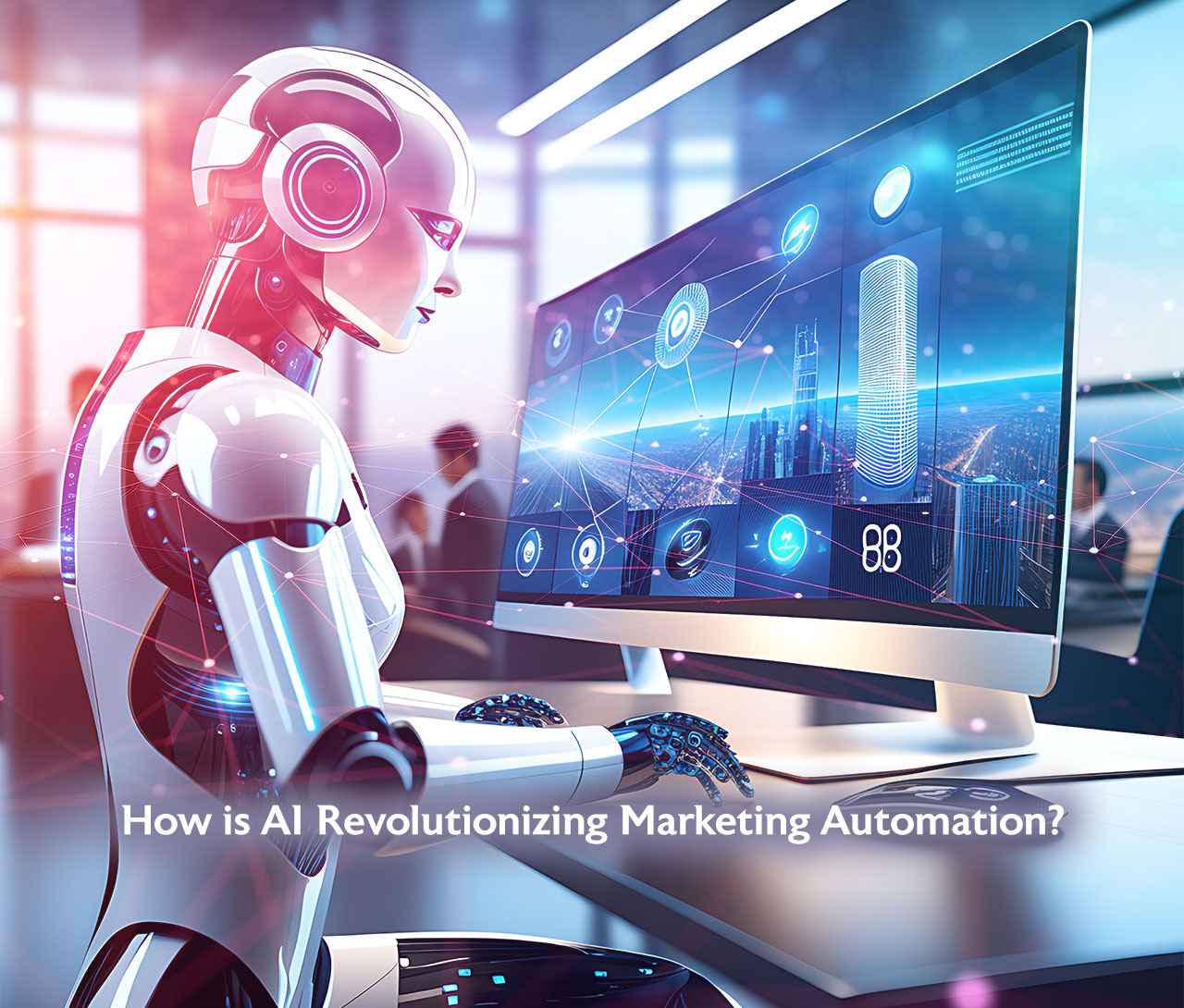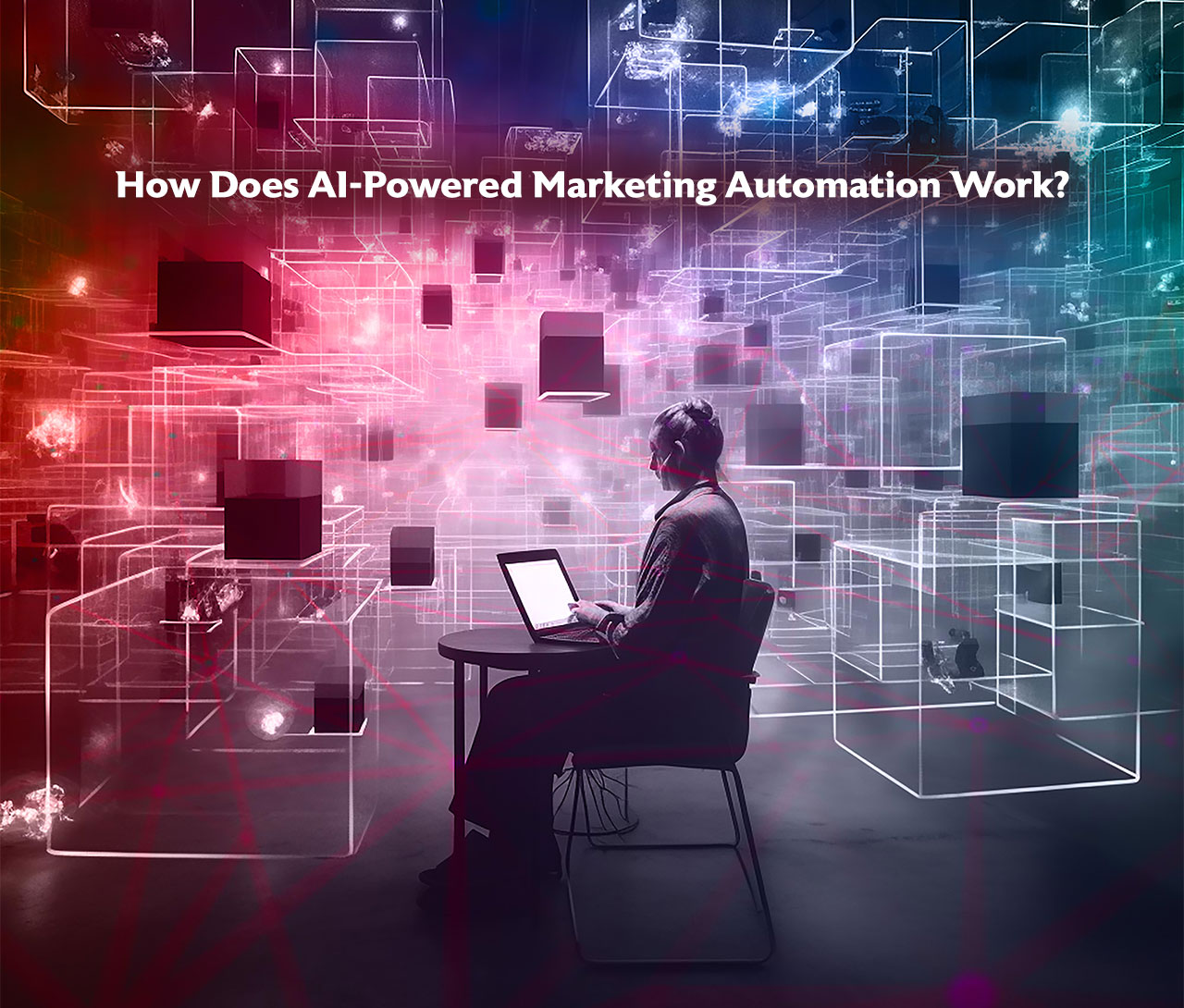Artificial intelligence (AI) continues to strengthen its hold on every industry, especially marketing. The AI technology market is extensive, reaching approximately $200 billion in 2023, and projected to soar to over $1.8 trillion by 2030. Fast-forwarding today AI-powered marketing automation is not an alien concept but a trillion-dollar goldmine. Let’s understand everything about it.
What is Marketing Automation?
Marketing automation refers to the utilization of software systems enabling businesses to efficiently reach consumers through automated marketing communications across various channels like emails, websites, social media platforms, and messaging apps to attract potential customers.
Implementing marketing automation solutions facilitates time-saving, enhance outcomes, and minimizes human error by automating repetitive tasks. This enables marketers to focus on more strategic responsibilities such as devising marketing strategies, audience targeting, analysis, maintaining brand consistency, monitoring key performance indicators (KPIs), and other essential functions, rather than engaging in mundane tasks.
How is AI Revolutionizing Marketing Automation?
AI leverages machine learning to emulate human learning processes and enhance accuracy by analyzing extensive datasets. When integrated into marketing automation systems, AI scrutinizes vast data pools to identify trends, forecast customer actions, and execute prompt decisions. Consequently, AI and machine learning algorithms empower marketers to automate and refine tasks that would otherwise be laborious, time-intensive, and costly. It’s no wonder that AI-driven marketing automation is becoming increasingly prevalent. The top 28% of businesses actively incorporate marketing automation and AI tools into their operations.
Marketers should embrace AI-powered marketing automation for several compelling reasons, backed by examples and statistics:
- Personalization: Epsilon’s survey found that 80% of customers are more inclined to engage with businesses offering personalized experiences. AI enables marketers to achieve this scale of personalization by analyzing customer data and providing tailored recommendations. For instance, Netflix employs AI algorithms to suggest content based on users’ viewing habits, resulting in enhanced engagement and retention rates.
- Cost Efficiency: AI streamlines repetitive tasks, saving marketers both time and money. AI-powered chatbots, for instance, can manage customer inquiries and support around the clock, reducing reliance on human customer service agents and yielding significant cost savings over time. Moreover, AI aids in optimizing advertising expenditure by identifying the most effective channels and campaigns, thus minimizing wasted ad spend.
- Optimization: Accenture’s study indicates that companies incorporating AI in marketing witness an average ROI increase of up to 30%. AI assists marketers in uncovering new growth opportunities, refining ad spend allocation, and enhancing customer engagement, ultimately leading to improved returns on investment.
- Predictive Analytics: By analyzing customer data and behavior, AI offers predictive insights that empower marketers to anticipate customer needs and preferences. For example, Amazon leverages AI to recommend products based on customers’ purchase history and browsing behavior, resulting in heightened customer satisfaction and increased sales.
AI marketing automation equips marketers with the tools to deliver personalized experiences, optimize costs, enhance ROI, and leverage predictive analytics, ultimately driving business success in today’s competitive landscape.
Why Should Marketers Use AI-Powered Marketing Automation?
Integrating AI into marketing automation systems offers numerous benefits for marketers. Firstly, it streamlines marketing processes, freeing up valuable time and resources for tasks like brainstorming and strategizing. AI-powered marketing automation also facilitates personalized content delivery to customers by leveraging data and algorithms.
Additionally, AI marketing automation drives cost efficiency by automating repetitive tasks. For instance, the use of AI chatbots for customer communication eliminates the need for human customer service agents, resulting in long-term cost savings.
Moreover, companies that adopt AI in marketing witness a substantial increase in ROI, with Accenture’s study indicating an average boost of up to 30%. This underscores the significant impact that AI can have on marketing effectiveness and profitability.
How Does AI-Powered Marketing Automation Work?
The fundamental steps involved in the operation of marketing automation are as follows:
- Data Collection: The software gathers data about potential customers through various digital interactions, such as website visits, email interactions, and app usage.
- Database Creation: It then organizes this collected data into a comprehensive database, identifying and segmenting potential customers based on various criteria.
- Campaign Design: The software designs targeted campaigns tailored to different customer segments, incorporating personalized attributes to effectively engage the target audience.
- Personalized Content Delivery: It enhances campaign effectiveness by delivering personalized content through the appropriate channels at optimal times, a task that would be challenging to execute manually given the multitude of digital marketing platforms.
- Lead Nurturing: The software employs predetermined schedules and triggers based on customer actions to guide prospects through the sales funnel, ultimately converting them into qualified leads.
- Performance Analysis: Finally, the software analyzes campaign performance to assess what strategies are effective and what adjustments are needed to optimize marketing ROI, thereby continuously refining its approach.
Which are the Best Tools For AI Marketing?
Here’s a sneak peek of five AI-powered marketing automation tools:
- Optimove: Optimove is an AI-powered marketing automation tool that excels at analyzing customer data to generate actionable insights. It identifies customers who may be too exposed to company communication, suggests campaigns drop based on loss, and offers valuable recommendations to enhance customer engagement.
- Beacon AI: The Beacon’s AI Outreach Tool, founded by former creators and tech entrepreneurs John and Lisa, merges technology and passion to revolutionize brand outreach for creators. This tool simplifies the process of generating personalized pitch emails to brands, making it effortless for creators to connect with potential partners. It offers access to a vast array of brands, ensuring creators can pitch to any brand they desire, while customizable tone options guarantee each pitch reflects the creator’s unique voice and style.
- InstaText: InstaText is an AI-powered tool that provides follower analysis and offers custom quotes for business and scholar users. Its AI-driven features enable users to gain valuable insights into their audience and create tailored content to engage and resonate with their followers.
- ClickUp: ClickUp leverages AI-powered editing features to optimize content, simplify writing, and summarize documents. It provides already-formatted content templates, saving time and effort on content marketing endeavors by streamlining the content creation and editing process.
- Smartly.io: Smartly.io is an all-encompassing AI-powered marketing automation tool that enables automated collaboration and provides a suite of tools for social media management, campaign tracking, influencer management, and insight analytics. It streamlines various aspects of marketing operations, allowing for efficient and effective management of marketing campaigns.
These tools leverage AI to automate marketing tasks, enhance content creation, and optimize campaign performance, making them valuable assets for businesses seeking to streamline their marketing efforts.
How to Choose the Right AI-Powered Marketing Automation Tool?
Selecting the right marketing automation software amidst a plethora of options can be overwhelming. To make an informed decision, consider the following crucial factors:
- User Interface: The platform’s user interface significantly impacts usability. Opt for a solution with a user-friendly interface, ensuring easy comprehension and a minimal learning curve. Prioritize platforms offering demos or free trials to evaluate features and functionalities.
- Features and Integrations: Assess the platform’s features and integrations to ensure alignment with your business’s unique needs. Test all offerings, including those seemingly unnecessary, as they may inspire innovative ideas and drive business growth.
- Customer Support: Reliable customer support is invaluable, especially during the software implementation phase. Look for platforms offering dedicated support through various channels like phone, email, and live chat. Inquire about response times and available resources for issue resolution.
- Pricing: While pricing is essential, it should not be the sole determining factor. Evaluate pricing relative to the features you require and consider scalability for future business expansion. Choose platforms with transparent pricing structures.
- Setup and Onboarding: The setup and onboarding process can influence the software’s successful implementation. Seek providers offering comprehensive setup assistance and onboarding support. Inquire about remote or in-person assistance options and associated charges, if any.
The Bottom Line
AI-powered marketing automation has the power to transform traditional marketing practices. Through automating repetitive tasks, analyzing vast amounts of data, and offering predictive insights, AI empowers marketers to make data-driven decisions and refine their strategies in ways previously unattainable. While AI’s influence on marketing job roles is profound, marketers can adapt and thrive by embracing innovative technologies and staying abreast of industry advancements. With the right mindset and training, marketers can harness AI’s potential to stay competitive and drive success in an ever-evolving digital landscape.


